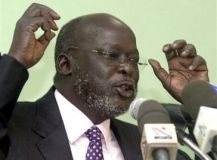Garang death breeds African conspiracy theories
By Daniel Wallis
NAIROBI, Aug 10 (Reuters) – The death of Sudanese Vice-President John Garang in a Ugandan helicopter crash has spawned a host of bizarre conspiracy theories in east Africa — ranging from sabotage to Rwandan hijackers sneaking on board.
 Ugandan President Yoweri Museveni, whose helicopter Garang had been using, is particularly incensed by reports in Kampala that have gone into overdrive following the July 30 shock death of his friend and talismanic former southern rebel chief.
Ugandan President Yoweri Museveni, whose helicopter Garang had been using, is particularly incensed by reports in Kampala that have gone into overdrive following the July 30 shock death of his friend and talismanic former southern rebel chief.
Garang waged a 21-year war against Sudan’s northern Islamist government. But just months after signing a peace deal, his body was found in the wreckage of the aircraft after it plummeted into the remote mountains on the border with northeast Uganda.
The chopper crashed during a storm, and Garang’s supporters have said they do not suspect foul play.
Leading the charge with a frenzy of claims surrounding his death is Uganda’s Red Pepper newspaper, a popular tabloid that mixes political rumours with lots of female flesh.
First it claimed, without giving any evidence, that the chopper was sabotaged in a failed bid to kill Museveni.
Then on Monday it suggested spies from neighbouring Rwanda had sneaked on board and shot Garang twice in the head before the crash — drawing an angry response from the government.
“The Red Pepper’s extra heads, persons, bullet wounds etc are simply a figment of their speculative reporting and should be ignored,” Ugandan Defence Minister Amama Mbabazi said this week as the bodies of the Ugandan crew were flown home.
“No people unknown to the pilots, engineer or security officers sneaked stealthily or otherwise onto the chopper.”
Officially, 14 people died including Garang. But rumours of a mystery “15th corpse” have been fuelled by the apparently disintegrated state of the bodies found by rescuers.
Mbabazi said false and insensitive reporting could damage regional peace and security efforts. But it is not only the salacious Red Pepper that has attracted government criticism.
Uganda’s independent Daily Monitor implied that Museveni had lent his friend a defective helicopter. It quoted sources as saying Museveni had opted not to use his helicopter for a trip to Rwanda in June because it had technical problems.
“CRIMINAL RUMOURS”
Museveni’s office pointed out that the chopper had been undergoing a $1.4 million refurbishment in Belarus at the time.
“It is criminal for anyone to say that,” raged senior presidential adviser John Nagenda about the report.
Last week Museveni ordered his information minister to correct another Monitor story that said Sudan was holding the bodies of the Ugandan crew until its investigation was over.
At prayers for the dead Ugandans on Wednesday, Museveni vowed to close newspapers he said were “vultures” meddling in security issues with their speculations about Garang.
He highlighted the Red Pepper.
“I thought those were confused young boys busy with naked girls,” he told the crowds. “If they have gone from there to regional security, they must stop, or we will stop them.”
Media reports in Sudan, where news of Garang’s death triggered riots that killed at least 130 people, have been more restrained — not least because two newspapers were suspended for a day over their coverage of the street violence.
One of the most inflammatory — that government-aligned militia leader Paulino Matiep had also been killed — fuelled the north-south bloodshed. He later appeared on TV.
“This and additional false claims that other southern leaders had died sparked widespread panic,” the International Crisis Group think-tank said in a report.
Eager to ally fears about the mechanical condition of his helicopter, Museveni drove almost 1,000 km (620 miles) to Yei in southern Sudan on Friday to pay last respects by Garang’s coffin and assure mourners the chopper had been in good shape.
But he was criticised by the Sudanese government for suggesting “an external factor” may have caused the crash.
A spokesman said they were “pretty sure” it was an accident due to bad weather, and hoped all parties, especially Uganda, would stop issuing statements that were not based on facts.
